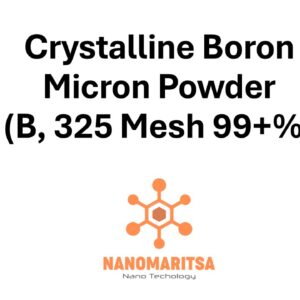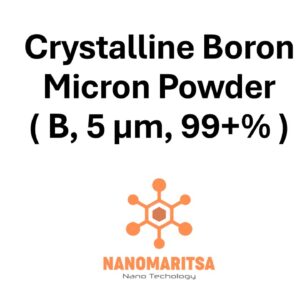Vanadium Micron Powder (V, 99.9%, 100 Mesh) is a high-purity vanadium powder whose particles pass through a 100-mesh sieve (approximately 150 micrometers or finer). Renowned for its role in enhancing mechanical strength and corrosion resistance when alloyed with steel and other metals, vanadium is also valued for its catalytic properties in chemical processes and its emerging importance in advanced energy storage systems. The powder’s fine particle size and 99.9% purity level ensure reliable performance across various high-tech and industrial applications, from specialty alloys to next-generation batteries.
- Key Properties
- High Purity (99.9%)
Elevated purity supports consistent behavior in critical applications, reducing contamination-related failures in aerospace, nuclear, and other industries demanding stringent quality. - Fine Particle Size (100 Mesh)
Particles sieved at 100 mesh (≤150 µm) offer a balanced surface area for enhanced reactivity and uniform mixing in metallurgical processes, catalysts, and composite formulations. - Strength and Hardness Enhancements
Vanadium is renowned for increasing tensile strength, hardness, and wear resistance when alloyed with steel or titanium, vital for cutting tools, aerospace parts, and high-performance machinery. - High Melting Point (~1,910 °C)
Vanadium’s elevated melting temperature enables it to perform reliably under extreme heat, making it suitable for high-temperature alloys and specialized furnace components. - Catalytic Activity
The element’s catalytic properties see frequent use in sulfuric acid production and other reactions, leveraging vanadium’s ability to accelerate chemical processes efficiently.
- High Purity (99.9%)
- Applications
- Steel and Alloy Production
Small amounts of vanadium can significantly improve the strength, ductility, and toughness of steel, making it ideal for structural beams, pipelines, tool steels, and automotive components. - Aerospace and Defense
Vanadium-based alloys demonstrate excellent high-temperature stability and mechanical resilience, applied to critical parts in aircraft engines, turbine blades, and defense equipment. - Catalysts for Chemical Processing
Vanadium compounds enable the oxidation of sulfur dioxide to sulfur trioxide (key in sulfuric acid production), among other catalytic reactions that underpin large-scale industrial processes. - Energy Storage (Vanadium Redox Flow Batteries)
Vanadium’s multiple valence states make it the active element in vanadium redox flow batteries (VRFBs), a promising technology for large-scale renewable energy storage. - Powder Metallurgy and Additive Manufacturing
Fine vanadium powders can be used in powder-based processes to create specialized alloy parts with precise compositions and enhanced mechanical properties.
- Steel and Alloy Production
- Advantages
- Enhanced Mechanical Properties
Alloying vanadium with steels and other metals provides increased tensile strength, hardness, and impact resistance—prolonging component lifespans. - Corrosion and Wear Resistance
Vanadium-containing alloys exhibit improved resistance to corrosion and wear, supporting performance in harsh or corrosive environments. - High-Temperature Stability
The metal’s melting point and thermal stability make it suitable for applications exposed to extreme heat, limiting distortion or failure under severe operating conditions. - Versatile Catalytic Role
Whether in sulfuric acid manufacturing or other oxidation reactions, vanadium’s catalytic functions boost industrial efficiency and throughput. - Energy Innovation
In the energy sector, vanadium’s chemistry forms the core of VRFBs, offering long cycle life, ease of scalability, and fast response times for grid energy storage.
- Enhanced Mechanical Properties
- Recent Trends and Research
- Advanced Alloy Development
Continuous research explores new vanadium-based alloys with improved strength-to-weight ratios for aerospace and automotive innovation. - Vanadium Redox Flow Battery (VRFB) Improvements
Efforts to optimize electrolyte formulations, membrane technology, and cell design aim to enhance energy density and lower costs for large-scale energy storage. - Recycling & Sustainable Practices
As demand for vanadium grows, industries focus on reclaiming it from steel slag, spent catalysts, and VRFB systems, supporting a more circular and sustainable supply chain. - Additive Manufacturing Growth
As 3D printing technologies mature, the potential for using vanadium powder in custom alloy production may broaden, enabling intricate parts with specialized properties. - High-Temperature Ceramic Composites
Investigations into ceramics reinforced with vanadium compounds target improved mechanical strength and thermal shock resistance for high-stress applications.
- Advanced Alloy Development
- Future Prospects
- Scaling VRFB Energy Storage
As global energy grids incorporate more renewables, large-capacity vanadium-based batteries will help stabilize supply and demand, driving further research and commercial adoption. - Lightweight, High-Strength Transportation
Vanadium’s ability to reinforce metal matrices can support lighter, stronger components in automobiles, trains, and aircraft, improving efficiency and performance. - Expanded Chemical Processing
The catalytic versatility of vanadium may lead to novel chemical processes or improved methods for existing reactions, fueling growth in the fine chemicals and petrochemicals industries. - Aerospace and Defense Evolution
Demands for more fuel-efficient, durable aircraft engines and high-temperature rocket components will further incentivize the development of vanadium-rich superalloys. - Sustainable Metallurgy
Innovations in reclaiming and refining vanadium will reduce environmental impacts, ensuring a steady supply of high-purity powder for a wide range of industrial needs.
- Scaling VRFB Energy Storage
Thanks to its 99.9% purity, fine 100-mesh size, and powerful alloying and catalytic characteristics, Vanadium Micron Powder (V, 99.9%, 100 Mesh) remains a strategic resource for modern industries. From reinforcing steels and superalloys to enabling efficient chemical production and next-generation battery storage, vanadium’s unique capabilities promise continued relevance in an evolving technological landscape.
| Measurement (gr) | 100 grams, 500 grams, 1000 grams |
|---|






